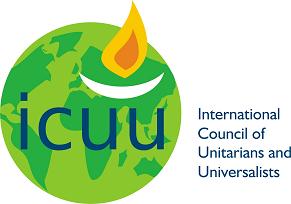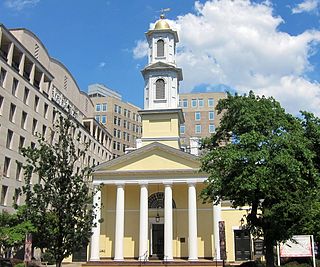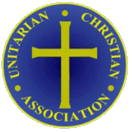
A creed, also known as a confession of faith, a symbol, or a statement of faith, is a statement of the shared beliefs of a community in a form which is structured by subjects which summarize its core tenets.

The International Council of Unitarians and Universalists (ICUU) was an umbrella organization founded in 1995 comprising many Unitarian, Universalist, and Unitarian Universalist organizations. It was dissolved in 2021 along with the Unitarian Universalist Partner Church Council to make way for a new merged entity. Some groups represented only a few hundred people; while the largest, the Unitarian Universalist Association, had more than 160,000 members as of May 2011—including over 150,000 in the United States.

The religious affiliations of presidents of the United States can affect their electability, shape their stances on policy matters and their visions of society and also how they want to lead it. Speculation of Thomas Jefferson, Abraham Lincoln, William Howard Taft, and Donald Trump being atheists was reported during election campaigns, while others, such as Jimmy Carter, used faith as a defining aspect of their campaigns and tenure to hold the office.

Unitarian Universalist Association (UUA) is a liberal religious association of Unitarian Universalist congregations. It was formed in 1961 by the consolidation of the American Unitarian Association and the Universalist Church of America, both Protestant Christian denominations with Unitarian and Universalist doctrines, respectively. However, modern Unitarian Universalists see themselves as a separate religion with its own beliefs and affinities. They define themselves as non-creedal, and draw wisdom from various religions and philosophies, including humanism, pantheism, Christianity, Hinduism, Buddhism, Taoism, Judaism, Islam, and Earth-centered spirituality. Thus, the UUA is a syncretistic religious group with liberal leanings.

Unitarian Universalism is a liberal religion characterized by a "free and responsible search for truth and meaning". Unitarian Universalists assert no creed, but instead are unified by their shared search for spiritual growth.
Unitarianism is a Nontrinitarian branch of Christianity. Unitarian Christians affirm the unitary nature of God as the singular and unique creator of the universe, believe that Jesus Christ was inspired by God in his moral teachings and that he is the savior of humankind, but he is not comparable or equal to God himself.
The General Assembly of Unitarian and Free Christian Churches is the umbrella organisation for Unitarian, Free Christians, and other liberal religious congregations in the United Kingdom and Ireland. It was formed in 1928, with denominational roots going back to the Great Ejection of 1662. Its headquarters is Essex Hall in central London, on the site of the first avowedly Unitarian chapel in England, set up in 1774.

Nontrinitarianism is a form of Christianity that rejects the mainstream Christian theology of the Trinity—the belief that God is three distinct hypostases or persons who are coeternal, coequal, and indivisibly united in one being, or essence. Certain religious groups that emerged during the Protestant Reformation have historically been known as antitrinitarian.

The Non-subscribing Presbyterian Church of Ireland is a non-creedal Christian Church, which maintains a great emphasis on individual conscience in matters of Christian faith.

The Evangelical Presbyterian Church (EPC) is an American church body holding to presbyterian governance and Reformed theology. It is most distinctive for its approach to the way it balances certain liberties across congregations on "non-essential" doctrines, such as egalitarianism in marriage or the ordination of women, alongside an affirmation of core "essential" doctrinal standards.

Progressive Christianity represents a postmodern theological approach, and is not necessarily synonymous with progressive politics. It developed out of the liberal Christianity of the modern era, which was rooted in the Enlightenment's thinking. Progressive Christianity is a postliberal theological movement within Christianity that, in the words of Reverend Roger Wolsey, "seeks to reform the faith via the insights of post-modernism and a reclaiming of the truth beyond the verifiable historicity and factuality of the passages in the Bible by affirming the truths within the stories that may not have actually happened."

Liberal Christianity, also known as Liberal Theology and historically as Christian Modernism, is a movement that interprets Christian teaching by taking into consideration modern knowledge, science and ethics. It emphasizes the importance of reason and experience over doctrinal authority. Liberal Christians view their theology as an alternative to both atheistic rationalism and theologies based on traditional interpretations of external authority, such as the Bible or sacred tradition.

The Universalist Church of America (UCA) was originally a Christian Universalist religious denomination in the United States. Known from 1866 as the Universalist General Convention, the name was changed to the Universalist Church of America in 1942. In 1961, it consolidated with the American Unitarian Association to form the Unitarian Universalist Association.

Conservative Christianity, also known as conservative theology, theological conservatism, traditional Christianity, or biblical orthodoxy is a grouping of overlapping and denominationally diverse theological movements within Christianity that seeks to retain the orthodox and long-standing traditions and beliefs of Christianity, it is contrasted with Liberal Christianity and Progressive Christianity which are seen as heterodoxies by theological conservatives. Conservative Christianity should not be mistaken as being synonymous with the political philosophy of conservatism nor the Christian right which is a political movement of Christians who support conservative political ideologies and policies within the realm of secular or non-sectarian politics. The two major subdivisions of Conservative Christianity within Protestantism are Evangelical Christianity and Christian Fundamentalism while the Confessing Movement, Confessionalism, and Neo-orthodoxy make up the remaining within Protestantism. Theological conservatism is also found in Roman Catholicism and is also found within Eastern Christianity although neither having a direct connection with the Fundamentalist–Modernist controversy.
In Britain, the term Free Christian refers specifically to individual members and whole congregations within the General Assembly of Unitarian and Free Christian Churches.
Biblical unitarianism is a Unitarian Christian denomination whose adherents affirm the Bible as their sole authority, and from it base their beliefs that God the Father is one singular being, and that Jesus Christ is God's son but not divine. The term "biblical Unitarianism" is connected first with Robert Spears and Samuel Sharpe of the Christian Life magazine in the 1880s. It is a neologism that gained increasing currency in nontrinitarian literature during the 20th century as the Unitarian churches moved away from mainstream church traditions and, in some instances in the United States, towards merger with Universalism. It has been used since the late 19th century by conservative Christian Unitarians, and sometimes by historians, to refer to scripture-fundamentalist Unitarians of the 16th–18th centuries.
Christian universalism is a school of Christian theology focused around the doctrine of universal reconciliation – the view that all human beings will ultimately be saved and restored to a right relationship with God. "Christian universalism" and "the belief or hope in the universal reconciliation through Christ" can even be understood as synonyms. Opponents of this school, who hold that eternal damnation is the ultimate fate of some or most people, are sometimes called "infernalists."
Unitarianism, as a Christian denominational family of churches, was first defined in Poland-Lithuania and Transylvania in the late 16th century. It was then further developed in England and America until the early 19th century, although theological ancestors are to be found as far back as the early days of Christianity. It matured and reached its classical form in the middle 19th century. Later historical development has been diverse in different countries.
The European Liberal Protestant Network is an association of free Christians and Liberal Protestants of Europe. It had its inaugural meeting at Bad Boll, Germany, July 1998 among Protestant members of the International Association for Religious Freedom.









